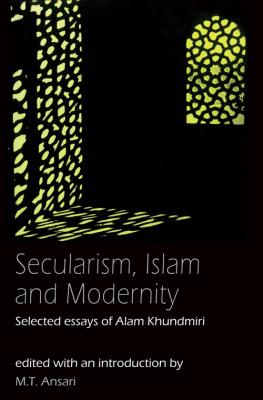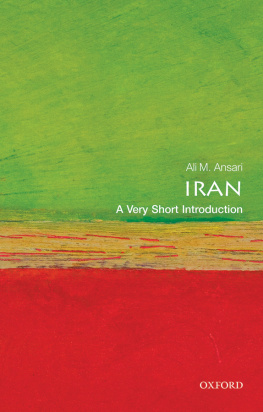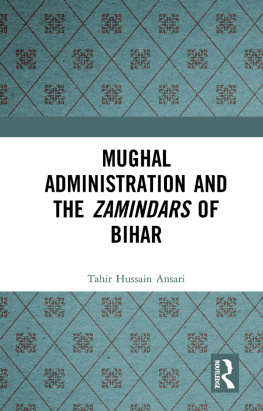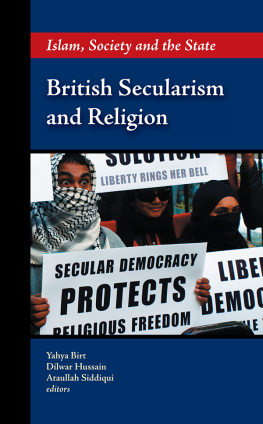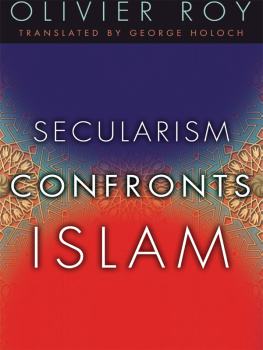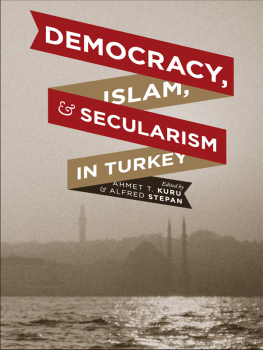Ansari - Secularism, Islam and Modernity
Here you can read online Ansari - Secularism, Islam and Modernity full text of the book (entire story) in english for free. Download pdf and epub, get meaning, cover and reviews about this ebook. year: 2013, publisher: SAGE Publications, genre: Religion. Description of the work, (preface) as well as reviews are available. Best literature library LitArk.com created for fans of good reading and offers a wide selection of genres:
Romance novel
Science fiction
Adventure
Detective
Science
History
Home and family
Prose
Art
Politics
Computer
Non-fiction
Religion
Business
Children
Humor
Choose a favorite category and find really read worthwhile books. Enjoy immersion in the world of imagination, feel the emotions of the characters or learn something new for yourself, make an fascinating discovery.
Secularism, Islam and Modernity: summary, description and annotation
We offer to read an annotation, description, summary or preface (depends on what the author of the book "Secularism, Islam and Modernity" wrote himself). If you haven't found the necessary information about the book — write in the comments, we will try to find it.
Ansari: author's other books
Who wrote Secularism, Islam and Modernity? Find out the surname, the name of the author of the book and a list of all author's works by series.
Secularism, Islam and Modernity — read online for free the complete book (whole text) full work
Below is the text of the book, divided by pages. System saving the place of the last page read, allows you to conveniently read the book "Secularism, Islam and Modernity" online for free, without having to search again every time where you left off. Put a bookmark, and you can go to the page where you finished reading at any time.
Font size:
Interval:
Bookmark:

Copyright Forum for Modern Thought and Literature 2001
Copyright of Introduction M.T. Ansari, 2001
All rights reserved. No part of this book may be reproduced or utilised in any form or by any means, electronic or mechanical, including photocopying, recording or by any information storage or retrieval system, without permission in writing from the publisher.
First published in 2001 by
| SAGE Publications India Pvt Ltd B1/I-1 Mohan Cooperative Industrial Area Mathura Road, New Delhi 110 044, India www.sagepub.in |
SAGE Publications Inc 2455 Teller Road Thousand Oaks, California 91320, USA |
SAGE Publications Ltd 1 Olivers Yard London EC1Y 1SP, United Kingdom |
SAGE Publications Asia-Pacific Pte Ltd 3 Church Street #10-04 Samsung Hub Singapore 049483 |
Published by Vivek Mehra for SAGE Publications India Pvt Ltd
Library of Congress Cataloging-in-Publication Data
Khvundmiri, Alam.
[Essays. Selections]
Se cularism, Islam and modernity: selected essays of Alam Khundmiri/edited by M.T. Ansari.
p. cm.
Includes bibliographical references and index.
1. Islam20th century. 2. Islam and secularism. 3. Philosophy, Islamic.
I. Ansari, M.T., 1965 II. Title.
BP163.K552297.2dc21 2001 00068793
ePub ISBN: 9789351500131
The SAGETeam: Arpita Das, Radha Dev Raj and Santosh Rawat
Kadir Zaman
M.T. Ansari
Asghar Ali Engineer
He performed no miracles, he made no history, yet for many of us he remains no less than a legend. Those who heard him speak in private or in public on any subject were deeply impressed by his scholarship, intellect and zest. Addressing a gathering of learned scholars and religious luminaries he could speak on Sufism for two hours without repeating a single idea. He could also speak with the same ease and finesse on Marxian aesthetics to renowned intellectuals. In both cases the effect was spellbinding.
To some, Alam was a deeply religious person. To some others, he was not at all religious. Founders of religious traditions and philosophers of all periods captivated him; he resonated their ideas with a contemporary charge in conversations. Alam was a true humanist with rare philosophical insight: one of the last in a series of outstanding scholars and thinkers who enlivened various regions of India during the freedom struggle and the immediate post-independence years. If his essays continue to inspire and influence us, as he did people, especially the youth, of his generation, the Forums venture of publishing them would be well rewarded.
Our Forum was formed in December 1980. Its first seminar, held in February 1981, was attended by such celebrated personages as Kaifi Azmi and V.R. Narla. In his keynote address Narla declared: You will, I am sure, agree with me when I say that when we are seeing all around utter cynicism and unashamed selfishness, men of the type of Alam become very rare indeed. The proceedings were subsequently collected and published in book form in Urdu and in English; the latter was released by Shyam Benegal. Thereafter, the Forum has held several meetings and seminars on various issues of vital concern; for instance, Silence is Crime was the theme of a seminar held in 1991. A souvenir listing the activities of the Forum from 1981 to 1991 was brought out at this time. Today its distinguished members include Aziz the artist, B. Narsing Rao, Issac Sequeira, Bhaskar Shewalkar, Pramod Shinde, Syed Sirajuddin and Mughni Tabassum.
In our present endeavour we had help from many sources. A meeting of friends and admirers of Alam Khundmiri was held in Chicago a few years ago and the participants wholeheartedly supported our plan (and provided funds for initial expenditure) to publish a selection of his essays. Khadija Alam and Farrukh Siyer furnished us with manuscripts of most of the essays. Asghar Ali Engineer enriched this collection with his Perspectives on Islam and Philosophy. Javeed Alam, Raj Bahadur Goud and Taqi Ali Mirza were very supportive. Many other friendsparticularly, Shahid Ali Abbasi, Muhammad Zaheeruddin Ahmed, Mehdi Arslan, Ayesha Farooqui, Anwar Mouzzam, Asma Rasheed, Muslehuddin Sadi and Hussain Zishaan went through the ordeal of helping us find bibliographical details. Given the scope of Alams scholarship, it will not be surprising that almost all the academic institutions and libraries in Hyderabad had to be ransacked to cross-check the references in the essays. It was indeed a Herculean task, and we have fulfilled it to the best of our ability. We are deeply indebted to Sage and to these friends without whose cooperation the book would perhaps have not gone to print.
M.T. Ansaris introductory essay as well as his painstaking efforts at editing need a special mention. Susie Tharu, the President of our organization, has been a force to reckon with behind all our efforts and this volume made more demands on her time than ever before.
The Forum extends its sincere thanks to all those who helped in bringing out this volume.
Kadir Zaman | |
Hyderabad, | Secretary, Forum for |
September 1999 | Modern Thought and Literature |
an Indian Islamic Identity
M.T. A NSARI
Verily never
Will God change the condition
Of a people until they
Change it themselves .
(Quran, xiii, 11)
For Europe, Islam was a lasting trauma.
Edward Said
It would be a commonplace to note that writers are, sometimes, more consequential than their writings. In Alam Khundmiris case nothing could have been truer; he was more than a writer and he lived through a time that was formative of Hyderabad as well as indicative, even symptomatic, of the problems constantly being hurled at, that have always beset, our nation. Therefore it is crucial that we ponder on what was said in his writings, and, equally important, on what remains unsaid in his writings, on what is inscribed in the space between these essays. My introduction, then, is an attempt to put this life together from a critical perspective so as to provide a context-sensitive frame for this collection of essays.
Syed Alam Khundmiri was definitely more than a writer. Born in Hyderabad on 7 February 1922, Alam, until his death on 27 September 1983, led a politically, philosophically and aesthetically active life. Those who knew (of) him unhesitatingly declare that he was an as a lecturer in the department of philosophy and as a respected and accepted member of the Hyderabad literati, he was always in the thick of most of the thought and action in Hyderabad.
Despite this Poundian act, of being at the vortex of the active, intellectual as well as political, life of a nation-in-process, his essays stand on their own merit. They are not just important because Alam wrote them, they are important in that through them Alam articulates his uneasealways a shadowy presence, to be read between the essayswith the idea(1)s available for his time. Glancing over the titles of his essays, one can easily pinpoint those nodal points around which his thinking revolved: Islam, reason, self, time, morality, law, knowledge, modernity, secularism, Indian Sufism and, definitely, Iqbal. Given the three different locations of his self, it is understandable that his three major concerns were Marxism, existentialism and Islam.setting. They have to be seen as critical experiments where he plays off the three dominant concerns of his life: Marxismwith its indifference to questions of minorities in nationalism, existentialismas being closed off to the problems of community and to the public composition of the self, and Islamwhich is examined in relation to history and notions of time and change.
Next pageFont size:
Interval:
Bookmark:
Similar books «Secularism, Islam and Modernity»
Look at similar books to Secularism, Islam and Modernity. We have selected literature similar in name and meaning in the hope of providing readers with more options to find new, interesting, not yet read works.
Discussion, reviews of the book Secularism, Islam and Modernity and just readers' own opinions. Leave your comments, write what you think about the work, its meaning or the main characters. Specify what exactly you liked and what you didn't like, and why you think so.

